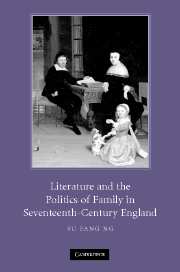Book contents
- Frontmatter
- Contents
- Acknowledgments
- Introduction: strange bedfellows – patriarchalism and revolutionary thought
- PART I REVOLUTIONARY DEBATES
- PART II RESTORATION IMAGININGS
- Interchapter: revolutionary legacies
- 5 Execrable sons and second Adams: family politics in Paradise Lost
- 6 Marriage and monarchy: Margaret Cavendish's Blazing World and the fictions of queenly rule
- 7 Marriage and discipline in early Quakerism
- Epilogue: the family-state analogy's eighteenth-century afterlife
- Index
6 - Marriage and monarchy: Margaret Cavendish's Blazing World and the fictions of queenly rule
Published online by Cambridge University Press: 22 September 2009
- Frontmatter
- Contents
- Acknowledgments
- Introduction: strange bedfellows – patriarchalism and revolutionary thought
- PART I REVOLUTIONARY DEBATES
- PART II RESTORATION IMAGININGS
- Interchapter: revolutionary legacies
- 5 Execrable sons and second Adams: family politics in Paradise Lost
- 6 Marriage and monarchy: Margaret Cavendish's Blazing World and the fictions of queenly rule
- 7 Marriage and discipline in early Quakerism
- Epilogue: the family-state analogy's eighteenth-century afterlife
- Index
Summary
NEW MONARCHY, OLD CAVALIERS
On the eve of the Restoration, William Cavendish, the Earl of Newcastle, later to become duke, wrote a book of advice for the future Charles II. In it, he advocates the use of ceremony to maintain royal authority, urging Charles “to shew your Selfe Gloryously, to your People; Like a God, for the Holly writt sayes, wee have Calld you Godds – & when the people sees you thus, they will Downe of their knees, which is worshipp, & pray for you with trembling Feare, & Love.” Besides comparing kings to gods, Newcastle also employs the Stuart marriage analogy to describe the king's relation to his people: “the king, & the Comonweath is no more to be Separated Then Christe & his Church” (72). With these overtones of divine-right kingship, it is not surprising that Newcastle's views take an absolutist cast. Thus church and law are to be “Bound upp under your Majesties prerogative” (34), that is the king should have transcendent authority over both. Newcastle warns against attempts by both churchmen and lawyers to appropriate sovereignty for themselves. While acknowledging that the king cannot go against God's law, he claims that churchmen “expound Gods will to bee what is best for their Advantage, & then they are kinges, & Rule” (34). Similarly, lawyers claim special knowledge of the law: “The Lawyeres sayes The kinge is to bee obayd, butt not againeste the Lawe, – & the – Lawyeres will Expound the Lawe to their beste advantage to Rule – & thus Robb your Majestie of your subiects, to bee their Subiects” (34).
- Type
- Chapter
- Information
- Publisher: Cambridge University PressPrint publication year: 2007



